I had no idea what to expect when I applied to the Lambda Literary Foundation’s Writers Retreat for Emerging LGBT Voices. I only knew that the retreat came highly recommended by former Fellows and other people plugged into the queer writing community (i.e. not me). I went anyway, and let me tell you, it was the best $700 plane ticket I ever bought. It was literally the gayest thing I’ve ever done and that’s including writing for Autostraddle and that time I laid around in bed scissoring with a rugby player for three hours while drinking craft beer and listening to Sleater-Kinney.
I hopped off the plane at LAX with a dream and my cardigan. No, scratch that. I wish I’d brought my cardigan. I was dressed for my dream California weather, which for someone who hasn’t spent much time west of Nebraska, meant cut offs and t-shirts. Boy, was I unprepared.
So I hopped off the plane at LAX with a dream and no cardigan. I waited at the coordinated spot as queers started amassing for the rented shuttle to take us from the airport to American Jewish University where the retreat took place. Sidenote about American Jewish University: the campus is almost entirely kosher, supremely inaccessible, isolated from cafes and restaurants and almost anything else fun, and has a giant Israeli flag flying in front of its student center. So here we are, a bunch of mostly non-Jewish queers on a hilltop, isolated from almost everything, including good cell reception. Summer camp for adults, or Hogwarts; whichever metaphor does it for you.
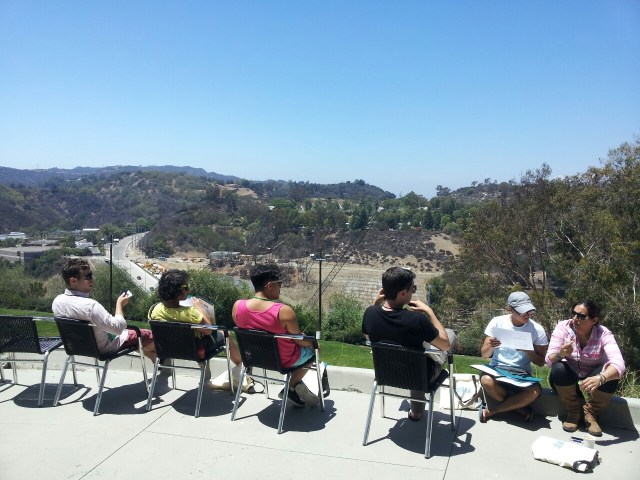
via Miguel M. Morales’s The Latino Writer
That night, we were all welcomed by the executive director of Lambda Literary Foundation, Tony Valenzuela, and LLF’s Program Coordinator, Kyle Sawyer. We also got a chance to meet with our individual groups and the workshop leaders. I met my amazing Nonfiction (Ravenclaw) group and our fearless leader, Sarah Schulman. Samuel Delany led Fiction (Gryffindor), David Groff led Poetry (Slytherin), and Malinda Lo led YA/Genre (Hufflepuff).
For seven days we workshopped our writing, slept in dorm rooms, scrounged for booze and cigarettes (both of which were hard to find in isolation), and bonded. This was the first time I was surrounded by 50+ queer writers. It rocked my socks. Here are some things I learned:
1. My identity is valid. I’ve been out for eight years. For seven of those years, my identity as a queer, genderqueer person didn’t change. My gender presentation was all over the place as I tried to figure out if I liked wearing skirts or baggy pants (or both!). Because my gender expression changed, no matter what I kept telling people around me, few people believed I was a real genderqueer. Whatever that means. But at this retreat, I was able to request gender neutral pronouns, was able to identify as a female-bodied, femme-presenting genderqueer, and no one questioned my identity or motives. You would think this would happen in any queer space, but unfortunately that’s not true. So the fact that it was no big deal, and I didn’t have to fucking explain myself to anyone, was monumental and affirming.
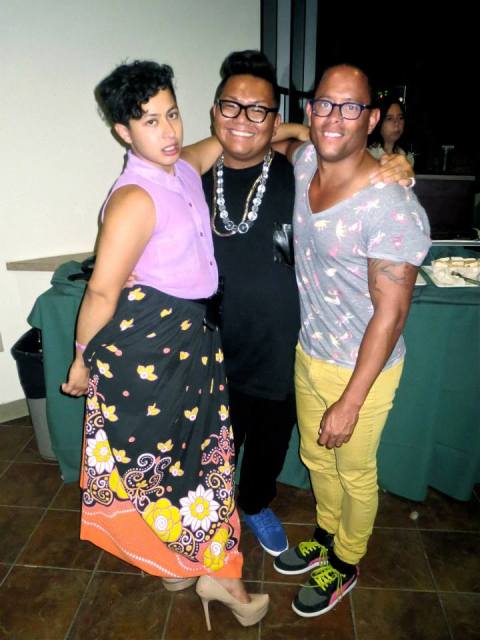
via Joshua Barton’s New Amurican Gospels
2. As a queer writer, the cards are stacked against you. The corporate publishing industry has its white gay male darlings (David Sedaris, Augusten Burroughs, Michael Cunningham). We have our white lesbians who happened to publish at a time when “LGBT Lit” didn’t exist as a categorical option so they were shelved and promoted with everyone else (Dorothy Allison, Jeanette Winterson, Rita Mae Brown). And we have our token queers of color (James Baldwin, Audre Lorde, Sapphire). But in terms of conglomerate, large-scale publishing, it’s hard to get attention if you’re a queer writer, especially if you’re writing about queer things. Most big publishers have their one gay book for their fall or spring release lists, and all of us queer writers are then competing for that same slot. Instead of helping each other reach a bigger audience, we’re competing against each other to get noticed. Of course, there are other options, like independent publishers and small presses. Amy Scholder, the Editorial Director of The Feminist Press, gave a talk at the retreat about non-corporate publishing options. This is why community building is so important.
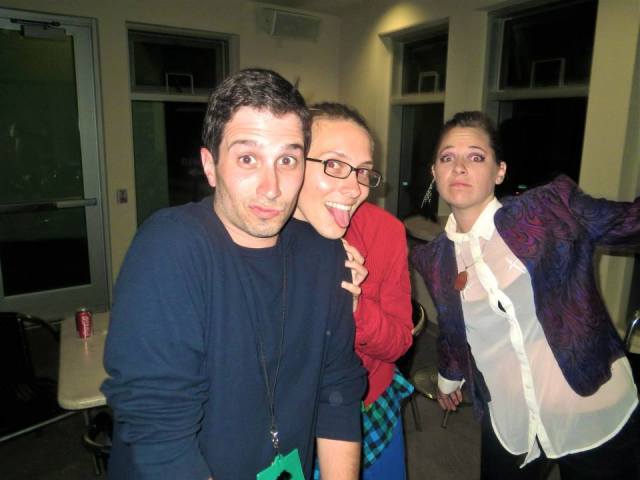
via Joshua Barton’s New Amurican Gospels
3. I should be promoting other queer writers. If our student readings at the end of the retreat were any indication, this community is full of bang-up talent. Everyone at the retreat was there because they were great writers, but when queer writers do get published, they often don’t get the benefit of publicity or press from mainstream media. As a community, that’s where we need to step in. We need to promote queer writers and artists, especially through word of mouth and on the Internet. Our voices can reach farther than we think. So join that queer book club, or go to that open mic, and support the talent in our community.
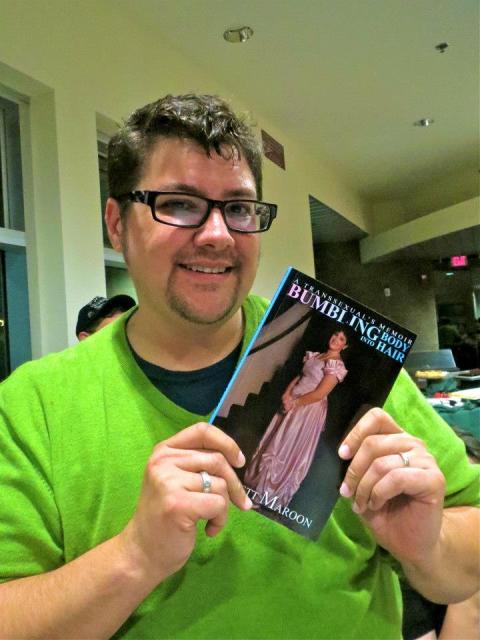
via Trans/plant/portation
4. The “queer” community is varied and divided. I think we all know this, but sometimes I forget the degree of variation in community politics. Kyle Sawyer presented a Trans*Ally workshop about writing trans* characters. It took us nearly an hour and a half to get through a list of definitions. Two points of contention: the word queer, which some people didn’t identify with, especially people of color who viewed the word as whitewashed; and the word cisgender, which some non-trans* people rejected because it was not a label they picked. We all had a tense, marvelous conversation that highlighted the dissonance in the community.
Some points worth mentioning: Samuel Delany (a walking queer history book) pointed out that a decade before Stonewall before “gay” became the mainstream label he and his friends used “queer” to identify themselves. To him, queer started as a term used by the working class and people of color.
It’s also important to point out that wanting to pick a term for yourself comes from a position of privilege. While I believe that everyone should identify however they want, using the term cisgender is a small way to position yourself as a trans* ally and to stand in solidarity with the trans* community.
5. HIV/AIDS is On Going, Going On. For most of my queer existence, I’ve been fairly removed from the fight against HIV/AIDS. Except for attending fundraisers and occasionally posting stuff on Facebook, I never really thought too much about it. This retreat gave me a serious reality check. The fight against HIV/AIDS and more importantly, the fight to support those living with HIV/AIDS is an important responsibility of our community that I, for one, never want to forget again.
6. Queer people of color need safe spaces, too. This year, the LLF retreat hosted the first ever Queer Writers of Color Caucus. In an open forum, we talked about issues particular to the queer-of-color community, and came up with strategies for LLF to attract and retain more queer writers of color. As an organization, LLF has come under fire in the past for being whitewashed. At the Lambda Literary Awards, Cherrie Moraga took LLF to task for its history of neglect when it comes to queer people of color. In the past few years, under the leadership of Tony Valenzuela, LLF has tried to change that perception by reaching out to queer-of-color populations. At the caucus, we came up with more ways to do outreach, one of which is spreading the word in our own communities. So if you’re a queer writer of color, apply to the retreat!
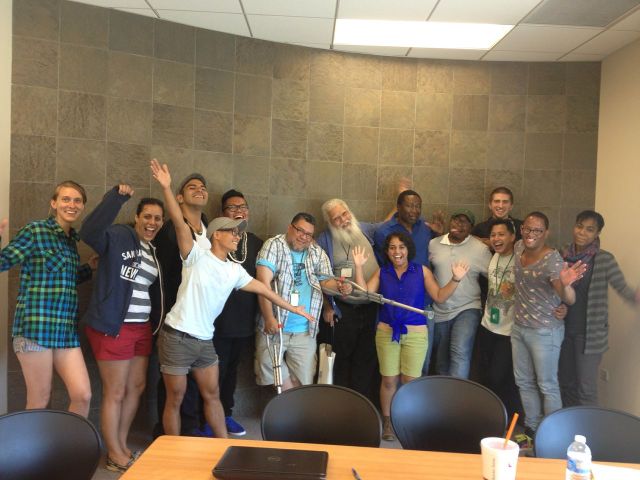
via Lambda Literary Foundation
7. Our mentors are important. For any writer, it’s important to have mentors who care about your work. For queer writers, I discovered just how important it is not only to have writing mentors, but to have writing mentors who are queer. While we want non-queer people to read and love our work, there is nothing like having an insider perspective and critique. In the wider world, we are forced to explain our writing, our lives and our identities. It’s easy for our writing to get bogged down by marginalia and footnotes. But at this workshop, I brought my work in without explanations. And my classmates got it. They got it. So find your queer mentors, and value them.
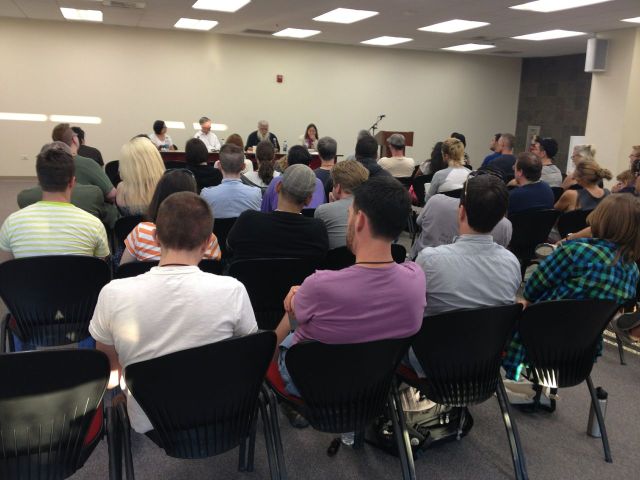
via Lambda Literary Foundation
8. Community is everything. Ours is a community that has survived so much. We’ve lived through struggle, and just because queer rights is a visible fight now does not mean that we can be apathetic about community building. We are still very much endangered. We need each other.

via Lambda Literary Foundation
If you’re a queer or trans* writer, I encourage you to apply to the LLF Writers Retreat for Emerging LGBT Voices. Go learn about the 2013 Fellows. Like their Facebook pages, follow them on Twitter and Tumblr, and support the next generation of people who will be bringing our stories into the world.
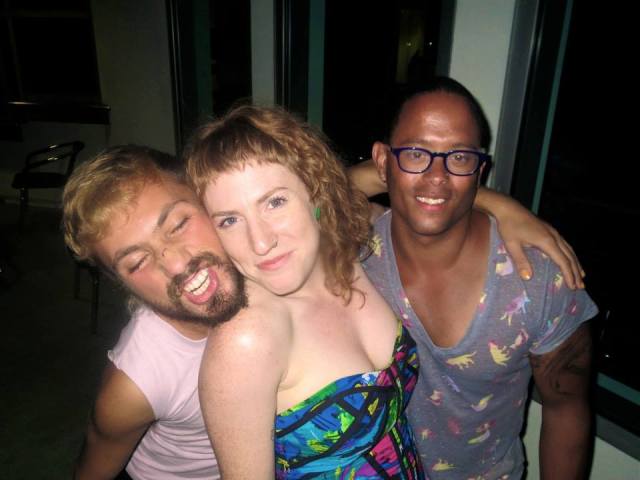
via Joshua Barton’s New Amurican Gospels
Special Note: Autostraddle’s “First Person” column exists for individual queer ladies to tell their own personal stories and share compelling experiences. These personal essays do not necessarily reflect the ideals of Autostraddle or its editors, nor do any First Person writers intend to speak on behalf of anyone other than themselves. First Person writers are simply speaking honestly from their own hearts.








Comments
“It was literally the gayest thing I’ve ever done and that’s including writing for Autostraddle and that time I laid around in bed scissoring with a rugby player for three hours while drinking craft beer and listening to Sleater-Kinney.”
^ this is my new favorite sentence
Your icon is my new favorite icon (one of them, anyway).
“In the wider world, we are forced to explain our writing, our lives and our identities. It’s easy for our writing to get bogged down by marginalia and footnotes.”
!! Yes. Thank you for sharing this, Sindu — if I were more serious about writing this sounds like exactly the kind of space I’d be looking for.
Part of me is curious to hear what alternatives non-trans* people would have to “cisgender,” but the rest of me fears treading potential TERF ground. What were your feelings about this, especially as a genderqueer person?
(I am a cis woman, by the way, just one who’s yet to hear a convincing argument against the label especially in the context of toxic debates about identity/privilege in UK circles of feminism: http://stavvers.wordpress.com/2013/03/21/the-problem-with-the-word-cis/)
Possible arguments against the use of cis:
a) it’s a label that originates within western discourses and contexts – we are gradually acknowledging that we can’t apply transgender to non-western peoples and cultures unless they specifically identify with it – what does this mean for cis? who do we get to call cis? given that most of the discussion surrounding cis is about how we have the right to call people cis without their consent, and even when they specifically ask us not to call them cis, how does that play out outside of American / European contexts? are we entitled to call people in the Global South cis simply because we’re entitled to call anyone cis? if we’re not, and if cis remains tied to such specific (western) contexts, what is the point of adopting it as a frame of reference when discussing oppression? won’t it always be inherently not intersectional?
b) cis / trans recreates another binary that not only doesn’t take into account, e.g., genderqueer individuals who step outside that binary, but also ignores the very (very) wide range of gender expressions and experiences of being gendered within cis and trans categories – in very simple and reductive terms, there are cis women who don’t pass as cis, and trans women who do – what does this mean for cis privilege?
c) a lot of the time, the language in which being cis is defined is – for lack of a better term – problematic and very hostile to women specifically – a lot of the time people will say being cis means you “identify” with the gender you’re assigned at birth (instead of, for example, your gender is the gender you were assigned at birth) – this language implies that you make an active choice to be the gender you were assigned at birth because being that gender is just so great and validating for you – this runs counter to quite a lot of women’s experience of being women, so we really have to do away with the language of choice surrounding cis (and trans) and gender – being a woman is no more of a choice than being a human being, it’s not a matter of what you “identify” as
I guess these are less arguments against the concept of cis itself and more arguments against the way it’s currently used – and for coming up with better ways to use it.
a) we have to agree on terchnological hegemony. Western white folks (to differentiate from non-western – see homophobic atrocities in Russia) aren’t culturally superior as far as ‘culture’ goes but they are the current plaything of the only truly game-changing force – technology. Which is literally the messiah. All history is human fail (due to darwinian programming not meshing with sapience too well) covered by a technological band-aid every single time.
Slavery – curtailed by automated production.
Women – made equal by Colonel Colt and automation of menial physical functions. Ultimate equality to be delivered by advanced reproductive techs.
Gay rights – modern comms preventing non-conforming individuals from being isolated and overwhelmed by a mob rule.
Binary transsexual people – a monotonous record of cultural thirdgendering across the board , broken only by technological advances and putting, i’m sorry, kitty where the mouth is. (you’re welcome to the delicious lesbian undertone of that phrasing).
Genderqueer/non-binary folks – gender gets kinda silly and old-fashioned when we’re talking about radical modding to werewolf (trust me the furry culture only needs the shiny metal delivered, they have minds nonconflicting with it – in bulk) – or for fucks sake BEING a tank or a starship – temporarily or completely.
Poverty – sorry, post-scarcity is the only answer there.
Bottom line – all cultures, inc Western, are just pretty tales written to justify petty bullies wanting to be the top dog in their sandbox. technology is the underlying reality that forces them to change to better. Agents of change speak the language not of the West – but of functionalism, engineering and power over nature. Note i did not say ‘science’ because that is not necessarily connected with the spread of technology. China. Gunpowder.
b) why anything that trivial had to even be put in writing? i would think that’s something that has a hard, definite answer right now, called philosophical essentialism/functionalism dichotomy. specifically the functionalism side – if something quacks like a duck i.e. performs the functional side of it – there is only one possible empirical conclusion. And if we don’t want that – mostly i guess it comes down to an inability to cope with the idea of non-passing cis people losing cis privilege – we inevitably have to alter ‘our oooh tradition’, ‘our oooh culture’ to account for them and protect them – and voila, you get transsexual folks protected as a side-effect. And laurels of their saviour for being all about cis interests. Win/win. Unless…someone is invested in having an underclass and a supremacy setup more than they’re invested in anything else. Come clean?
c) i would think the answer to that is the silly little realisation that yea, being a woman is not a choice and a not a matter of who you ‘identify’ as – and it stands true of all women, transsexual or cis. (specified transsexual because gq folks aren’t exactly about being a woman)
Personally: I am very cis, and I have absolutely no problems identifying as such. What I DO have a problem with is this burgeoning dichotomy between cis and trans* whereby cis remains the default and trans* is… pretty much everything else. It just feels incredibly reductive to me–as far as I’m concerned, “cis or trans*” is about as comprehensive as “man or woman” (i.e. not very).
…Then again, I’m not trans*, so what do I know?
Then again, I do recognize that most of the pushback against “cis” as a term comes from cis people who resent the categorization and labeling–a process that only “variant” folk are usually exposed to–of their status as “norm”.
Here is my clumsy interpretation of “cis” people being grumpy being called “cis” under gender/sex discussions:
I personally think the people who feel uneasy about the world and most vehemently are against it usually have it the most(?); I am strictly speaking in my experience and my personal thoughts on the word “cis”. For me it’s different, I’m not necessarily offended or wear the term with pride but when it comes to talking about gender/sex issues, *I* struggled finding a word to explain how I felt about gender and my sex. When I learned of the term “cis,” I was like “okay, hey let’s continue with the conversation!”
When I read and witnessed people being so offended by the term usually fall into two categories: They are in fact genderqueer but too tired and apathetic to always correct pronouns or do not like gender neutral pronouns that are used in most circles, the other group of people think it’s a slur, which I can’t. I too have yet to find another term that is better than “cis,” it’s a neutral trait/term for me. Being thin, tall, cis, trans* etc. are traits (identities) that will give you privileges while others can leave you marginalized.
When I would participate in these discussions those who fell in the latter category (saw it as a slur) often made me feel (this could be my own projection/bias) that they found themselves being “othered” or not seen as the default, which I thought “duh isn’t that the point?” It is similar to mentioning whiteness when I talk about race in the USian context or maleness in the feminist context. I feel like the people in question are being VERY defensive and I find the reaction interesting.
I don’t know, I just find this particular topic interesting on when it comes to language in order to express the experiences of those who are marginalized in society.
I don’t think that was clumsy at all — very astute. I agree that it’s usually a reaction to feeling “othered.” I’ve seen similar offense taken to the term “monosexual” (as opposed to bi/pan).
I completely agree with you! Thank you for your take on this.
The alternatives proposed (“biological woman,” “woman born woman”) are problematic when examined in a larger, sociohistorical context. If “woman” is a gender identity, then its relationship to biology or anatomy is up for debate. What constitutes a “biological woman,” anyway? Woman born woman, or womyn born womyn, is a term steeped in decades of trans* exclusion and discrimination.
I, for one, think “cis” is the best term we have right now. I think what’s hard for people is that these are labels that can also be identities. Because queer and trans are identities as well as labels, many people assume that cisgender also has to be an identity. While it is most definitely a label, and a useful one, I think it’s the idea of an identity being mapped onto them that people oppose. If we’re able to think of cisgender as a label that is useful to use in a larger conversation about gender, it becomes less contentious.
I think it’s an important moment in ally development to acknowledge privilege and then give some of it up. Using cisgender, a term you may not have ever picked, to label yourself and your identity is a way of giving up some of that privilege and turning the conversation by marking what is otherwise normative or unmarked. I think it makes people uncomfortable because they’re not used to their gender being marked. But that discomfort is precisely the reason we should use it.
As a genderqueer person, I feel like it’s also important to point out that there’s sometimes a trans/cis binary that does not account for the existence of genderqueer and other gender variant people. I hesitate to use the word trans to describe myself because I do sometimes benefit from cisgender privilege (because I am read as cis) and I don’t want to appropriate the narratives or identities of trans* people who don’t. And I know a lot of other genderqueer people who feel the same. So let’s not forget the clusterfuck of gender variance when talking about cis/trans.
I’ve heard both “biological woman” and “woman born woman” and they both make me deeply unhappy, though I am sometimes in two minds about shitting on people’s identity labels. But then again, if your labels are deliberately chosen despite being “steeped in decades of trans* exclusion and discrimination,” as you put it, then perhaps it’s fair game.
There’s something I particularly loathe about the essentialism at the heart of “woman born woman,” especially given that those who propagate it often claim to be against exactly that.
This is very well said and I agree so much (as well as everything else!):
“Using cisgender, a term you may not have ever picked, to label yourself and your identity is a way of giving up some of that privilege and turning the conversation by marking what is otherwise normative or unmarked. I think it makes people uncomfortable because they’re not used to their gender being marked. But that discomfort is precisely the reason we should use it.”
How receptive are LLB to non-conventional or interdisciplinary writer types? I’ve been interested in this and in VONA for some time but can’t deal with having to choose a style of writing – I work across genres and often collide them.
Although LLF makes you choose genres, I met a lot of people doing cross-genre work. You can apply to more than one genre, and it’s the workshop leaders who make the selections about who gets in. So if someone picks you, you can bet that your work is important and/or impressive to them.